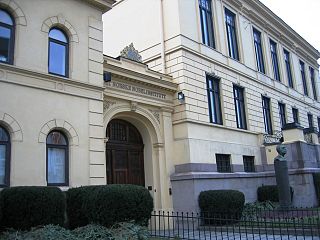| Year |
Laureate (birth/death) |
Country |
Rationale |
| 1901 |
 |
Henry Dunant
(1828–1910) |
Switzerland |
"for his humanitarian efforts to help wounded soldiers and create international understanding"[8][9] |
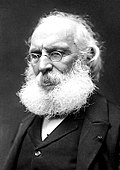 |
Frédéric Passy
(1822–1912) |
France |
"for his lifelong work for international peace conferences, diplomacy and arbitration."[8][9] |
| 1902 |
 |
Élie Ducommun
(1833–1906) |
Switzerland |
"for his untiring and skilful directorship of the Bern Peace Bureau"[8][10] |
 |
Charles Albert Gobat
(1843–1914) |
"for his eminently practical administration of the Inter-Parliamentary Union."[8][10] |
| 1903 |
 |
William Randal Cremer
(1828–1908) |
United Kingdom |
"for his longstanding and devoted effort in favour of the ideas of peace and arbitration."[8][11] |
| 1904 |
 |
Institute of International Law
(founded 1873) |
Belgium |
"for its striving in public law to develop peaceful ties between nations and to make the laws of war more humane."[8][12] |
| 1905 |
 |
Bertha von Suttner
(1843–1914) |
Austria-Hungary |
"for her audacity to oppose the horrors of war."[8][13] |
| 1906 |
 |
Theodore Roosevelt
(1858–1919) |
United States |
"for his role in bringing to an end the bloody war recently waged between two of the world's great powers, Japan and Russia."[8][14] |
| 1907 |
 |
Ernesto Teodoro Moneta
(1833–1918) |
Italy |
"for his work in the press and in peace meetings, both public and private, for an understanding between France and Italy"[8][15] |
 |
Louis Renault
(1843–1918) |
France |
"for his decisive influence upon the conduct and outcome of the Hague and Geneva Conferences."[8][15] |
| 1908 |
 |
Klas Pontus Arnoldson
(1844–1916) |
Sweden |
"for their long time work for the cause of peace as politicians, peace society leaders, orators and authors."[8][16] |
 |
Fredrik Bajer
(1837–1922) |
Denmark |
| 1909 |
 |
Auguste Beernaert
(1829–1912) |
Belgium |
"for their prominent position in the international movement for peace and arbitration."[8][17] |
 |
Paul Henri d'Estournelles de Constant
(1852–1924) |
France |
| 1910 |
 |
Permanent International Peace Bureau
(founded 1891) |
Switzerland |
"for acting as a link between the peace societies of the various countries, and helping them to organize the world rallies of the international peace movement."[18][19] |
| 1911 |
 |
Tobias Asser
(1838–1913) |
Netherlands |
"for his role as co-founder of the Institut de droit international, initiator of the Conferences on International Private Law (Conférences de Droit international privé) at the Hague, and pioneer in the field of international legal relations"[8][20] |
 |
Alfred Fried
(1864–1921) |
Austria-Hungary |
"for his effort to expose and fight what he considers to be the main cause of war, namely, the anarchy in international relations."[8][20] |
| 1912 |
 |
Elihu Root[A]
(1845–1937) |
United States |
"for bringing about better understanding between the countries of North and South America and initiating important arbitration agreements between the United States and other countries."[8][21] |
| 1913 |
 |
Henri La Fontaine
(1854–1943) |
Belgium |
"for his unparalleled contribution to the organization of peaceful internationalism."[8][22] |
| 1914 |
Not awarded due to World War I. |
| 1915 |
| 1916 |
| 1917 |
 |
International Committee of the Red Cross
(founded 1863) |
Switzerland |
"for the efforts to take care of wounded soldiers and prisoners of war and their families."[8][23] |
| 1918 |
Not awarded due to World War I. |
| 1919 |
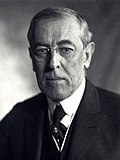 |
Woodrow Wilson[A]
(1856–1924) |
United States |
"for his role as founder of the League of Nations."[8][24] |
| 1920 |
 |
Léon Bourgeois
(1851–1925) |
France |
"for his longstanding contribution to the cause of peace and justice and his prominent role in the establishment of the League of Nations."[8][25] |
| 1921 |
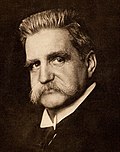 |
Hjalmar Branting
(1860–1925) |
Sweden |
"for their lifelong contributions to the cause of peace and organized internationalism."[8][26] |
 |
Christian Lange
(1869–1938) |
Norway |
| 1922 |
 |
Fridtjof Nansen
(1861–1930) |
Norway |
"for his leading role in the repatriation of prisoners of war, in international relief work and as the League of Nations' High Commissioner for refugees."[27][28] |
| 1923 |
Not awarded |
| 1924 |
| 1925 |
 |
Sir Austen Chamberlain[A]
(1863–1937) |
United Kingdom |
"for his crucial role in bringing about the Locarno Treaty."[8][29] |
 |
Charles G. Dawes[A]
(1865–1951) |
United States |
"for his crucial role in bringing about the Dawes Plan."[8][29] |
| 1926 |
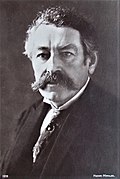 |
Aristide Briand
(1862–1932) |
France |
"for their crucial role in bringing about the Locarno Treaty."[8][30] |
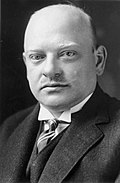 |
Gustav Stresemann
(1878–1929) |
Germany |
| 1927 |
 |
Ferdinand Buisson
(1841–1932) |
France |
"for their contribution to the emergence in France and Germany of a public opinion which favours peaceful international cooperation."[8][31] |
 |
Ludwig Quidde
(1858–1941) |
Germany
|
| 1928 |
Not awarded |
| 1929 |
 |
Frank Billings Kellogg[A]
(1856–1937) |
United States |
"for his crucial role in bringing about the Kellogg-Briand Pact."[8][32] |
| 1930 |
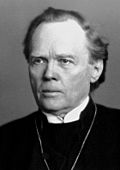 |
Nathan Söderblom
(1866–1931) |
Sweden |
"for promoting Christian unity and helping create 'that new attitude of mind which is necessary if peace between nations is to become reality'."[8][33] |
| 1931 |
 |
Jane Addams
(1860–1935) |
United States |
"for their assiduous effort to revive the ideal of peace and to rekindle the spirit of peace in their own nation and in the whole of mankind."[8][34] |
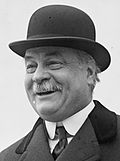 |
Nicholas Murray Butler
(1862–1947) |
United States |
| 1932 |
Not awarded |
| 1933 |
 |
Sir Norman Angell[A]
(1872–1967) |
United Kingdom |
"for having exposed by his pen the illusion of war and presented a convincing plea for international cooperation and peace."[35] |
| 1934 |
 |
Arthur Henderson
(1863–1935) |
United Kingdom |
"for his untiring struggle and his courageous efforts as Chairman of the League of Nations Disarmament Conference 1931-34."[8][36][37] |
| 1935 |
 |
Carl von Ossietzky[A][B]
(1889–1938) |
Germany |
"for his burning love for freedom of thought and expression and his valuable contribution to the cause of peace."[8][38] |
| 1936 |
 |
Carlos Saavedra Lamas
(1878–1959) |
Argentina |
"for his role as father of the Argentine Antiwar Pact of 1933, which he also used as a means to mediate peace between Paraguay and Bolivia in 1935."[8][39] |
| 1937 |
 |
The Viscount Cecil of Chelwood
(1864–1958) |
United Kingdom |
"for his tireless effort in support of the League of Nations, disarmament and peace."[8][40] |
| 1938 |
 |
Nansen International Office for Refugees
(1930–1939) |
League of Nations |
"for having carried on the work of Fridtjof Nansen to the benefit of refugees across Europe."[41] |
| 1939 |
Not awarded due to World War II. |
| 1940 |
| 1941 |
| 1942 |
| 1943 |
| 1944 |
 |
International Committee of the Red Cross[A]
(founded 1863) |
Switzerland |
"for the great work it has performed during the war on behalf of humanity."[42][43] |
| 1945 |
 |
Cordell Hull
(1871–1955) |
United States |
"for his indefatigable work for international understanding and his pivotal role in establishing the United Nations."[44] |
| 1946 |
 |
Emily Greene Balch
(1867–1961) |
United States |
"for her lifelong work for the cause of peace"[45] |
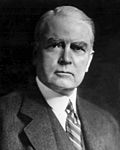 |
John Raleigh Mott
(1865–1955) |
United States |
"for his contribution to the creation of a peace-promoting religious brotherhood across national boundaries."[45] |
| 1947 |
 |
The Quakers (represented by Friends Service Council and American Friends Service Committee)[46][47]
(started during the mid-17th century) |
United States & United Kingdom |
"for their pioneering work in the international peace movement and compassionate effort to relieve human suffering, thereby promoting the fraternity between nations."[48] |
| 1948 |
Not awarded because "there was no suitable living candidate." (A tribute to the recently assassinated Mohandas Gandhi in India.)[49] |
| 1949 |
 |
Lord Boyd-Orr
(1880–1971) |
United Kingdom |
"for his lifelong effort to conquer hunger and want, thereby helping to remove a major cause of military conflict and war."[50] |
| 1950 |
 |
Ralph Bunche
(1904–1971) |
United States |
"for his work as mediator in Palestine in 1948-1949."[51] |
| 1951 |
 |
Léon Jouhaux
(1879–1954) |
France |
"for having devoted his life to the fight against war through the promotion of social justice and brotherhood among men and nations."[52] |
| 1952 |
 |
Albert Schweitzer[A]
(1875–1965) |
Germany/France |
"for his altruism, reverence for life, and tireless humanitarian work which has helped making the idea of brotherhood between men and nations a living one."[53] |
| 1953 |
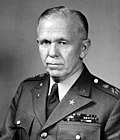 |
George Catlett Marshall Jr.
(1880–1959) |
United States |
"for proposing and supervising the plan for the economic recovery of Europe."[54] |
| 1954 |
 |
Office of the United Nations High Commissioner for Refugees[A]
(founded 1950) |
United Nations |
"for its efforts to heal the wounds of war by providing help and protection to refugees all over the world."[55] |
| 1955 |
Not awarded |
| 1956 |
| 1957 |
 |
Lester Bowles Pearson
(1897–1972) |
Canada |
"for his crucial contribution to the deployment of a United Nations Emergency Force in the wake of the Suez Crisis."[56][8] |
| 1958 |
 |
Dominique Pire
(1910–1969) |
Belgium |
"for his efforts to help refugees to leave their camps and return to a life of freedom and dignity."[57] |
| 1959 |
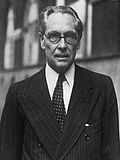 |
Philip Noel-Baker
(1889–1982) |
United Kingdom |
"for his longstanding contribution to the cause of disarmament and peace."[58] |
| 1960 |
 |
Albert Lutuli[A]
(1898–1967) |
South Africa |
"for his non-violent struggle against apartheid."[59][8] |
| 1961 |
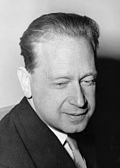 |
Dag Hammarskjöld[C]
(1905–1961) |
Sweden |
"for developing the UN into an effective and constructive international organization, capable of giving life to the principles and aims expressed in the UN Charter."[60][8] |
| 1962 |
 |
Linus Pauling[A]
(1901–1994) |
United States |
"for his fight against the nuclear arms race between East and West."[61] |
| 1963 |
 |
International Committee of the Red Cross
(founded 1863) |
Switzerland |
"for promoting the principles of the Geneva Convention and cooperation with the UN."[62] |
 |
League of Red Cross Societies
(founded 1919) |
| 1964 |
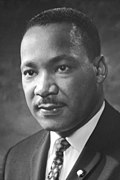 |
Martin Luther King Jr.
(1929–1968) |
United States |
"for his non-violent struggle for civil rights for the Afro-American population."[63] |
| 1965 |
 |
United Nations Children's Fund (UNICEF)
(founded 1946) |
United Nations |
"for its effort to enhance solidarity between nations and reduce the difference between rich and poor states."[64] |
| 1966 |
Not awarded |
| 1967 |
| 1968 |
 |
René Cassin
(1887–1976) |
France |
"for his struggle to ensure the rights of man as stipulated in the UN Declaration."[65] |
| 1969 |
 |
International Labour Organization
(founded 1919) |
United Nations |
"for creating international legislation insuring certain norms for working conditions in every country."[66] |
| 1970 |
 |
Norman Ernest Borlaug
(1914–2009) |
United States |
"for having given a well-founded hope - the green revolution."[67][8] |
| 1971 |
 |
Willy Brandt
(1913–1992) |
West Germany |
"for paving the way for a meaningful dialogue between East and West."[68] |
| 1972 |
Not awarded |
| 1973 |
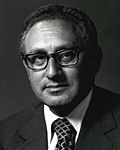 |
Henry Kissinger[D]
(1923–2023) |
United States |
"for jointly having negotiated a cease fire in Vietnam in 1973."[8][69] |
 |
Lê Đức Thọ[E]
(1911–1990) |
North Vietnam |
| 1974 |
 |
Seán MacBride
(1904–1988) |
Ireland |
"for his efforts to secure and develop human rights throughout the world"[70][8] |
 |
Eisaku Satō
(1901–1975) |
Japan |
"for his contribution to stabilize conditions in the Pacific rim area and for signing the Nuclear Non-Proliferation Treaty."[70][8] |
| 1975 |
 |
Andrei Sakharov[F]
(1921–1989) |
Soviet Union |
"for his struggle for human rights in the Soviet Union, for disarmament and cooperation between all nations."[71] |
| 1976 |
 |
Betty Williams
(1943–2020) |
United Kingdom |
"for the courageous efforts in founding a movement to put an end to the violent conflict in Northern Ireland."[72] |
 |
Mairead Corrigan
(born 1944) |
| 1977 |
 |
Amnesty International
(founded 1961) |
United Kingdom |
"for worldwide respect for human rights."[8][73] |
| 1978 |
 |
Muhammad Anwar el-Sadat
(1918–1981) |
Egypt |
"for jointly having negotiated peace between Egypt and Israel in 1978."[74] |
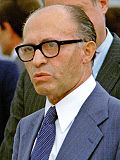 |
Menachem Begin
(1913–1992) |
Israel |
| 1979 |
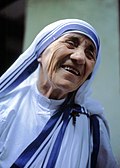 |
Mother Teresa
(1910–1997) |
India (born in the Ottoman Empire) |
"for her work for bringing help to suffering humanity."[75] |
| 1980 |
 |
Adolfo Pérez Esquivel
(born 1931) |
Argentina |
"for being a source of inspiration to repressed people, especially in Latin America."[76][8] |
| 1981 |
 |
Office of the United Nations High Commissioner for Refugees
(founded 1950) |
United Nations |
"for promoting the fundamental rights of refugees."[77] |
| 1982 |
 |
Alva Myrdal
(1902–1986) |
Sweden |
"for their work for disarmament and nuclear and weapon-free zones."[78][79] |
 |
Alfonso García Robles
(1911–1991) |
Mexico |
| 1983 |
 |
Lech Wałęsa[G]
(born 1943) |
Poland |
"for non-violent struggle for free trade unions and human rights in Poland."[80] |
| 1984 |
 |
Desmond Tutu
(1931–2021) |
South Africa |
"for his role as a unifying leader figure in the non-violent campaign to resolve the problem of apartheid in South Africa"[81] |
| 1985 |
 |
International Physicians for the Prevention of Nuclear War
(founded 1980) |
United States |
"for spreading authoritative information and by creating awareness of the catastrophic consequences of nuclear war."[82] |
| 1986 |
 |
Elie Wiesel
(1928–2016) |
United States (born in Romania) |
"for being a messenger to mankind: his message is one of peace, atonement and dignity."[83] |
| 1987 |
 |
Óscar Arias
(born 1940) |
Costa Rica |
"for his work for lasting peace in Central America."[84] |
| 1988 |
 |
United Nations Peace-Keeping Forces
(founded 1945) |
United Nations |
"for preventing armed clashes and creating conditions for negotiations."[85][86] |
| 1989 |
 |
Tenzin Gyatso,
14th Dalai Lama
(born 1935) |
India (born in Tibet)[87] |
"for advocating peaceful solutions based upon tolerance and mutual respect in order to preserve the historical and cultural heritage of his people."[88][89] |
| 1990 |
 |
Mikhail Gorbachev
(1931–2022) |
Soviet Union |
"for the leading role he played in the radical changes in East-West relations."[90] |
| 1991 |
 |
Aung San Suu Kyi[H]
(born 1945) |
Myanmar |
"for her non-violent struggle for democracy and human rights."[91] |
| 1992 |
 |
Rigoberta Menchú
(born 1959) |
Guatemala |
"for her struggle for social justice and ethno-cultural reconciliation based on respect for the rights of indigenous peoples."[92] |
| 1993 |
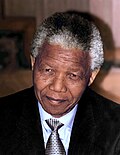 |
Nelson Mandela
(1918–2013) |
South Africa |
"for their work for the peaceful termination of the apartheid regime, and for laying the foundations for a new democratic South Africa."[93] |
 |
Frederik Willem de Klerk
(1936–2021) |
South Africa |
| 1994 |
 |
Yasser Arafat
(1929–2004) |
Palestine |
"for their efforts to create peace in the Middle East."[94] |
 |
Yitzhak Rabin
(1922–1995) |
Israel
|
 |
Shimon Peres
(1923–2016) |
Israel |
| 1995 |
 |
Joseph Rotblat
(1908–2005) |
Poland |
"for their efforts to diminish the part played by nuclear arms in international politics and, in the longer run, to eliminate such arms."[95] |
 |
Pugwash Conferences on Science and World Affairs |
Canada |
| 1996 |
 |
Carlos Filipe Ximenes Belo
(born 1948) |
East Timor |
"for their work towards a just and peaceful solution to the conflict in East Timor."[96] |
 |
José Ramos-Horta
(born 1949) |
East Timor |
| 1997 |
 |
International Campaign to Ban Landmines
(founded 1992) |
Switzerland |
"for their work for the banning and clearing of anti-personnel mines."[97] |
 |
Jody Williams
(born 1950) |
United States |
| 1998 |
 |
John Hume
(1937–2020) |
Ireland |
"for their efforts to find a peaceful solution to the conflict in Northern Ireland."[98] |
 |
David Trimble
(1944–2022) |
United Kingdom |
| 1999 |
 |
Médecins Sans Frontières |
Switzerland |
"in recognition of the organization's pioneering humanitarian work on several continents."[99] |
| 2000 |
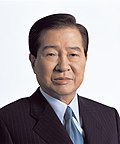 |
Kim Dae-jung
(1924–2009) |
South Korea |
"for his work for democracy and human rights in South Korea and in East Asia in general, and for peace and reconciliation with North Korea in particular."[100] |
| 2001 |
 |
United Nations |
United Nations |
"for their work for a better organized and more peaceful world."[101] |
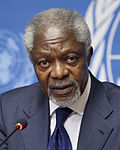 |
Kofi Annan
(1938–2018) |
Ghana |
| 2002 |
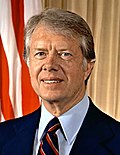 |
Jimmy Carter
(1924–2024) |
United States |
"for his decades of untiring effort to find peaceful solutions to international conflicts, to advance democracy and human rights, and to promote economic and social development."[102] |
| 2003 |
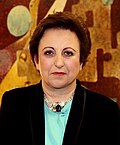 |
Shirin Ebadi
(born 1947) |
Iran |
"for her efforts for democracy and human rights. She has focused especially on the rights of women and children."[103] |
| 2004 |
 |
Wangari Muta Maathai
(1940–2011) |
Kenya |
"for her contribution to sustainable development, democracy and peace."[104] |
| 2005 |
 |
International Atomic Energy Agency
(founded 1957) |
United Nations |
"for their efforts to prevent nuclear energy from being used for military purposes and to ensure that nuclear energy for peaceful purposes is used in the safest possible way."[105] |
 |
Mohamed ElBaradei
(born 1942) |
Egypt |
| 2006 |
 |
Muhammad Yunus
(born 1940) |
Bangladesh |
"for their efforts to create social and economic development from below."[106] |
 |
Grameen Bank
(founded 1983) |
Bangladesh |
| 2007 |
 |
Intergovernmental Panel on Climate Change
(founded 1988) |
United Nations |
"for their efforts to build up and disseminate greater knowledge about man-made climate change, and to lay the foundations for the measures that are needed to counteract such change."[107] |
 |
Al Gore
(born 1948) |
United States |
| 2008 |
 |
Martti Ahtisaari
(1937–2023) |
Finland |
"for his important efforts, on several continents and over more than three decades, to resolve international conflicts."[108] |
| 2009 |
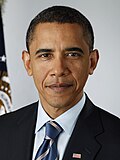 |
Barack Obama
(born 1961) |
United States |
"for his extraordinary efforts to strengthen international diplomacy and cooperation between peoples."[109] |
| 2010 |
 |
Liu Xiaobo[I]
(1955–2017) |
China |
"for his long and non-violent struggle for fundamental human rights in China."[110] |
| 2011 |
 |
Ellen Johnson Sirleaf
(born 1938) |
Liberia |
"for their non-violent struggle for the safety of women and for women's rights to full participation in peace-building work."[111] |
 |
Leymah Gbowee
(born 1972) |
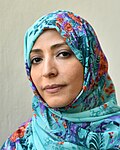 |
Tawakkol Karman
(born 1979) |
Yemen |
| 2012 |
 |
European Union
(founded 1958) |
European Union |
"for over six decades contributed to the advancement of peace and reconciliation, democracy and human rights in Europe."[112] |
| 2013 |
 |
Organisation for the Prohibition of Chemical Weapons
(founded 1997) |
Netherlands[113] |
"for its extensive efforts to eliminate chemical weapons."[114] |
| 2014 |
 |
Kailash Satyarthi
(born 1954) |
India |
"for their struggle against the suppression of children and young people and for the right of all children to education."[115] |
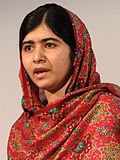 |
Malala Yousafzai
(born 1997) |
Pakistan |
| 2015 |
 |
Tunisian National Dialogue Quartet
(2013–2014) |
Tunisia |
"for its decisive contribution to the building of a pluralistic democracy in Tunisia in the wake of the Jasmine Revolution of 2011."[116] |
| 2016 |
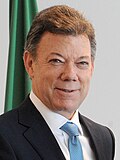 |
Juan Manuel Santos
(born 1951) |
Colombia |
"for his resolute efforts to bring the country's more than 50-year-long civil war to an end."[117] |
| 2017 |
 |
International Campaign to Abolish Nuclear Weapons
(founded 2007) |
Switzerland |
"for its work to draw attention to the catastrophic humanitarian consequences of any use of nuclear weapons and for its ground-breaking efforts to achieve a treaty-based prohibition of such weapons."[118] |
| 2018 |
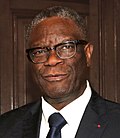 |
Denis Mukwege
(born 1955) |
Democratic Republic of the Congo |
"for their efforts to end the use of sexual violence as a weapon of war and armed conflict."[119] |
 |
Nadia Murad
(born 1993) |
Iraq |
|
| 2019 |
 |
Abiy Ahmed
(born 1976) |
Ethiopia |
"for his efforts to achieve peace and international cooperation, and in particular for his decisive initiative to resolve the border conflict with neighbouring Eritrea."[120] |
| 2020 |
 |
World Food Programme
(founded 1961) |
United Nations |
"for its efforts to combat hunger, for its contribution to bettering conditions for peace in conflict-affected areas and for acting as a driving force in efforts to prevent the use of hunger as a weapon of war and conflict."[121] |
| 2021 |
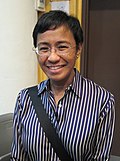 |
Maria Ressa
(born 1963) |
Philippines |
"for their efforts to safeguard freedom of expression, which is a precondition for democracy and lasting peace."[122] |
 |
Dmitry Muratov
(born 1961) |
Russia |
| 2022 |
 |
Ales Bialiatski[J]
(born 1962) |
Belarus |
"The Peace Prize laureates represent civil society in their home countries. They have for many years promoted the right to criticise power and protect the fundamental rights of citizens. They have made an outstanding effort to document war crimes, human right abuses and the abuse of power. Together they demonstrate the significance of civil society for peace and democracy."[123] |
 |
Memorial
(founded 1989) |
Russia |
 |
Centre for Civil Liberties
(founded 2007) |
Ukraine |
| 2023 |
 |
Narges Mohammadi[K]
(born 1972) |
Iran |
"for her fight against the oppression of women in Iran and her fight to promote human rights and freedom for all"[124] |
| 2024 |
 |
Nihon Hidankyo
(founded 1956) |
Japan |
"for its efforts to achieve a world free of nuclear weapons and for demonstrating through witness testimony that nuclear weapons must never be used again"[125] |
